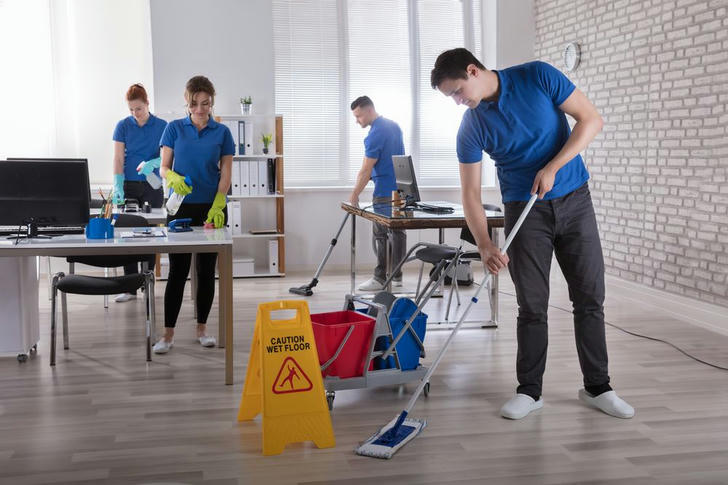Unlocking Opportunities in Office Cleaning Careers: Salaries, Benefits, and Pathways to Entry
As businesses across the United States increasingly prioritize workplace hygiene and safety, the demand for office cleaning professionals has surged. This sector offers not only steady employment but also pathways for career advancement, making it an attractive option for individuals seeking flexible part-time work or a foothold in facility management. With hourly wages ranging from $12 to over $19 depending on geographic location, office cleaning roles provide financial stability while addressing critical public health needs. This article explores earning potential, non-monetary benefits, and actionable strategies for entering and advancing within this growing industry.

Earning Potential in 2024: Regional Variations and Trends
National Salary Benchmarks
Office cleaning positions offer competitive compensation, particularly when accounting for regional cost-of-living adjustments. According to aggregated data from major job platforms:
- Indeed reports a national average base salary of $15.67 per hour, with entry-level roles starting at $12.10/hour and experienced professionals earning up to $20.28/hour.
- ZipRecruiter data aligns closely, showing an annual average of $30,828 ($15/hour), with top earners exceeding $39,000 annually.
High-Paying Markets
Geographic location significantly impacts earning potential:
- Bellevue, WA leads with wages 25% above the national average at $19.53/hour
- Scotts Valley, CA offers annual salaries nearing $40,000 for full-time roles
- Grand Rapids, MI provides $16/hour positions with benefits packages uncommon in the industry
Mid-tier markets like Columbus, OH ($15.14/hour) and Houston, TX ($14.50–$17.25/hour) remain viable options, particularly for those prioritizing lower living costs over maximum earnings.
Part-Time Opportunities
Flexible schedules dominate the sector:
- Westlake, OH: $16.50–$17.25/hour evening shifts
- Howell, MI: $15/hour weekend positions accommodating student schedules
- Brighton, MI: $15–$16/hour overnight custodial roles in medical facilities
Job seekers should cross-reference salary data with local cost-of-living indices through platforms like the MIT Living Wage Calculator to assess real-world purchasing power.
Benefits Beyond the Paycheck
1. Schedule Flexibility
The industry's operational demands create diverse scheduling options:
- Night shifts (e.g., 6 PM–12 AM) enabling daytime caregiving or education
- Weekend-only contracts at schools and corporate campuses
- Split shifts accommodating multiple part-time jobs
2. Employment Stability
Commercial cleaning demonstrates recession-resistant qualities:
- 89% of businesses maintained or increased cleaning budgets post-pandemic (ISSA survey)
- Medical facilities and financial institutions require daily sanitation regardless of economic conditions
3. Low Entry Barriers
Formal education requirements remain minimal:
- 92% of job postings emphasize reliability over diplomas
- On-the-job training typically occurs within first three shifts
- Veterans and career changers constitute 34% of new hires (Bureau of Labor Statistics)
4. Health-Conscious Work Environment
Physical activity inherent to cleaning tasks provides wellness advantages:
- 240–300 calories burned hourly during floor maintenance
- Reduced risks associated with sedentary office work
Strategic Job Search Tactics
1. Optimize Digital Applications
Major platforms yield the highest response rates:
- Indeed: Filter by "office cleaner + [city]" and sort by posting date
- ZipRecruiter: Enable alerts for "commercial cleaner" and "floor care specialist"
Pro Tip: Apply within 24 hours of posting—high-demand markets like Bellevue fill positions in under 72 hours.
2. Leverage Hyperlocal Networks
Unadvertised opportunities abound through:
- Direct inquiries at medical complexes and corporate parks
- Community Facebook groups (e.g., "Tacoma Gig Workers")
- Staffing agencies specializing in facility services
3. Resume Optimization
Emphasize transferable skills:
- Time management (e.g., "Completed 25,000 sq. ft. office sanitization within 4-hour windows")
- Safety compliance (OSHA training, bloodborne pathogen certification)
- Equipment proficiency (auto-scrubbers, carpet extractors)
Career Advancement Pathways
1. Specialization
Niches command premium wages:
- Floor Maintenance: $16.04/hour (national average)
- Biohazard Cleanup: $18.20/hour in healthcare settings
- Green Cleaning: LEED-certified roles pay 12% above standard rates
2. Certification Programs
Employer-sponsored training opportunities include:
- IICRC Carpet Cleaning Technician ($800 value)
- OSHA 30-Hour General Industry ($150–$250)
- ISSA Cleaning Management Institute (CMI) credentials
3. Management Trajectories
Supervisory roles offer leadership experience:
- Shift leaders earn $16.82–$19.40/hour in Midwest markets
- Facility managers average $52,000 annually with benefits
4. Entrepreneurial Routes
Experienced professionals frequently launch contracting businesses:
- Startup costs under $10,000 for equipment/insurance
- Government contracts through SAM.gov registration
Industry Outlook and Projections
The U.S. Bureau of Labor Statistics projects 6% employment growth for janitorial staff through 2032, outpacing overall job market trends. Emerging factors influencing demand include:
- Hybrid work models requiring mid-week office sanitization
- Healthcare expansion driving 11% annual growth in medical cleaning
- Sustainability mandates increasing adoption of green cleaning protocols
Action Plan for Success
Research Local Markets
Compare wage data across 3–5 platforms (Indeed, Glassdoor, PayScale)Upskill Strategically
Pursue one certification within first six months of employmentBuild Professional Networks
Join associations like ARCSI (Association of Residential Cleaning Services International)Evaluate Long-Term Goals
Create a 3-year plan targeting management roles or business ownership
"This career gave me the flexibility to raise my kids while building skills that led to a supervisor position," notes Maria L., a single parent in Tacoma, WA, who increased her earnings by 38% within two years.
Conclusion
Office cleaning careers provide accessible entry points into stable employment markets with clear advancement trajectories. By strategically selecting geographic markets, pursuing certifications, and leveraging industry growth trends, professionals can transform these roles into sustainable long-term careers. As businesses continue prioritizing workplace health, skilled cleaning professionals will remain essential to organizational success across industries.
Salary data reflects June 2024 updates. Regional calculations incorporate cost-of-living indices from public economic databases.
